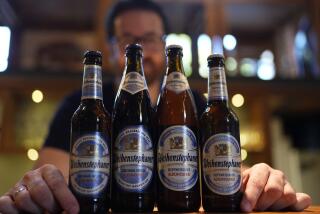Kosher Israeli Brew to Test Waters of World’s Imported Beer Capital
- Share via
Some say California put the gusto into America’s Mexican beer binge. Now, guess who’s shipping its suds to the West Coast? Israel.
The beer is named Maccabee after the Jewish soldiers who fought the Syrians in Jerusalem more than 2,100 years ago and took back the temple they had lost. While rededicating the temple, the Maccabees unknowingly began the festival of Hanukkah when--according to Jewish tradition--a small jar of oil that was expected to burn for one night miraculously lasted for eight.
At a time of year when some people are accustomed to buying so-called Christmas beers, along comes a brand that some people might assume is a beer for Hanukkah--which begins tonight at sundown.
But Maccabee is not marketed as a Hanukkah brew. “We don’t change our beer with the whim of the season,” said Matt Cohen, managing director of Tempo Beer Industries, a New York beer importer and distributor. “And we’re not a Jewish beer. We’re an Israeli beer.”
The beer is kosher, however. The Israeli breweries where Maccabee is made are routinely inspected by rabbis for cleanliness and for mixing the proper ingredients into the brew. That certification is etched in Hebrew on the label of each bottle.
At one time, Cohen said, he considered calling the beer He-brew. Along with that name, Cohen joked, he even considered this slogan: More taste, less guilt.
Although Maccabee is fairly new to the U.S. market, it is far and away the best-selling beer in Israel, where it accounts for nearly 70% of the beer sold. And last year, the Israeli brewer, Tempo Beer Industries Ltd., posted annual sales in excess of $100 million.
Now the company has its eyes on the world’s best market for imported beer--the United States. After introducing the beer in June with moderate success on the East Coast, the company has decided to introduce the beer to the unofficial capital of imported beer drinking--Southern California.
“Within the next 10 years, we hope to rank among the top 10 importers in America,” said Cohen, 26, who was raised in Los Angeles and whose father is Rabbi Jacob Simacha Cohen, president of the Southern California Board of Rabbis.
Experts say that to reach his lofty sales goals, Matt Cohen--whose grandfather-in-law is the founder of the Israeli brewery--has lots of work ahead. Nearly 400 beers already are imported into the United States. But imports only account for about 5% of annual U.S. beer sales. Heineken is still the No. 1 import and Corona ranks second. But after that, it’s a beer brawl.
“Imported beer is such a trendy thing that there’s almost no way to predict why one catches on and another doesn’t,” said Andrew Galvin, senior editor of Beverage World, the trade publication. “Imported beer is a market where image is more important than anything else.”
Some skeptics wonder if Maccabee can devise an image that will sell here.
“Maybe once we get it on the menu it will sell better than it has so far,” said Frank Solomon, bar manager at Jerry’s Famous Deli in Studio City, where a bottle of the premium beer sells for $3.25. “It’s going to take some time.”
At the same time, imported beer sales have fallen as much as 10% over the past year. “An Israeli beer may raise an eyebrow or two,” said Tom McNichols, marketing director of Corona’s Chicago-based importer, Barton Beers Ltd. “But it’s very tough to introduce a new brand in a declining market.”
The man in charge of introducing Maccabee to the West Coast is carefully pitching it to liquor stores that specialize in selling international beers. “Certain stores like to be in the chase for people who drink imported beers,” said Russell Davis, West Coast distributor for Maccabee.
Those are young professionals who can afford to pay up to $6 for a six-pack. To reach them, Maccabee has limited most of its $2-million annual advertising budget to several provocative ads that air only on “Late Night With David Letterman.” Adweek magazine critic Barbara Lippert called the spots “the Morton Downey of beer ads.”
One commercial showed two foaming beer bottles knocking against each other in bed accompanied by the sounds of a couple making love. After NBC refused to run it, Cohen asked his New York agency to change the sound track. Said Cohen: “The ads are sensual, not sexual.”
More to Read
Eat your way across L.A.
Get our weekly Tasting Notes newsletter for reviews, news and more.
You may occasionally receive promotional content from the Los Angeles Times.








